Believe it or not, there are food remedies to alleviate rheumatoid arthritis pain. Studies are beginning to shed light that certain foods containing a great amount of anti-inflammatory compounds could reduce the inflammation, thereby, relieving pain of arthritis.
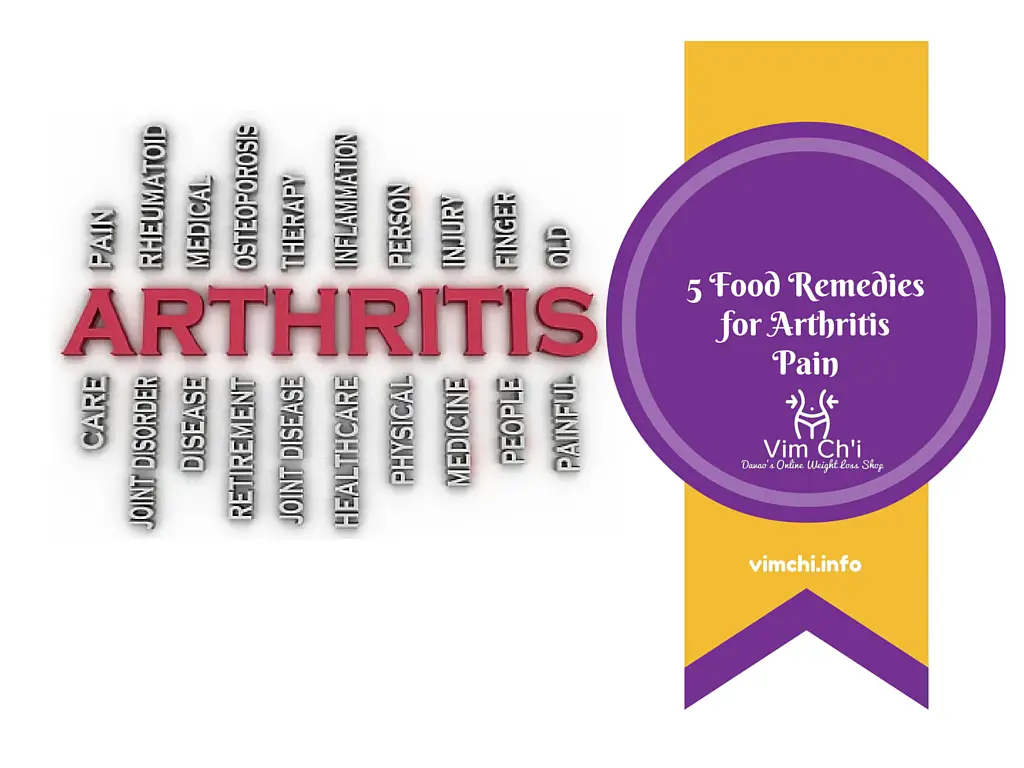
Why Anti-Inflammatory Compounds?
It’s not surprising. Bear in mind that arthritis involves inflammation of joint tissues. Doctors prescribe their patients with this condition to some forms of anti-inflammatory medicines to ease their suffering.
Unfortunately, scientists and doctors couldn’t fully understand the nature of arthritis. It’s not just about the wear and tear on cartilage. There are studies now that the free radicals may increase inflammation.
They also speed up the aging process, which greatly affects joints and cartilage causing them to deteriorate easily.
That said, it’s just appropriate to include foods with anti-oxidants to your daily diet as food remedies for rheumatoid arthritis pain.
Food Remedies to Ease the Pain of Rheumatoid Arthritis
Fatty Fish
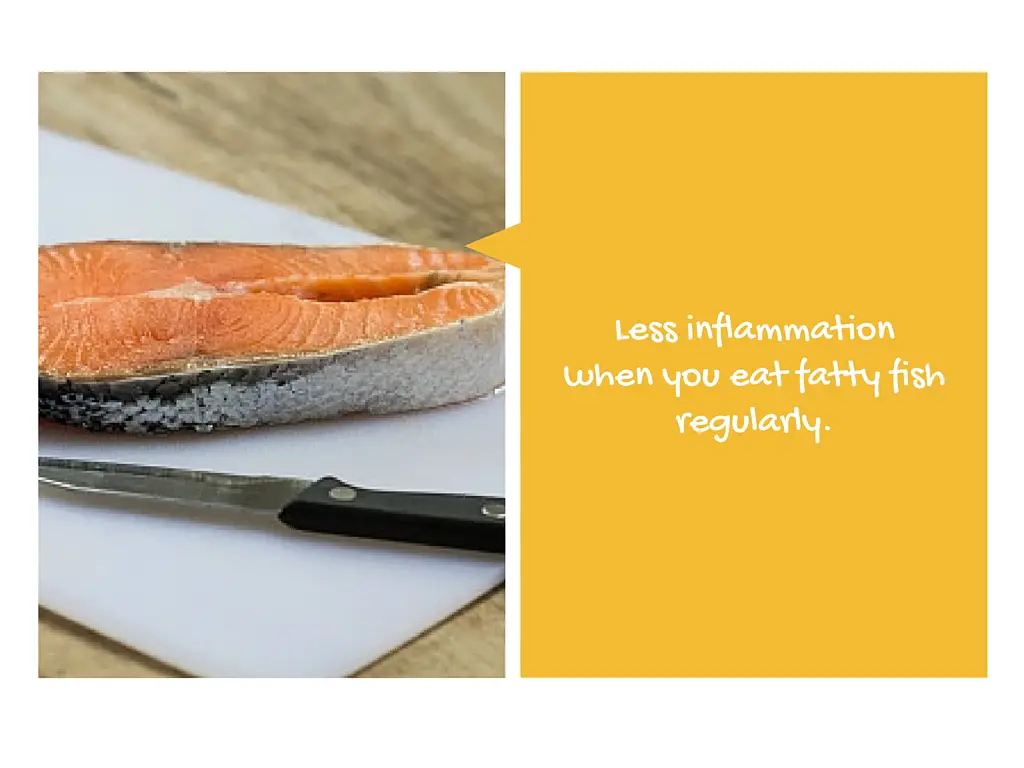
One great example is salmon. Scientists studying those who regularly eat fatty fish and suffering from arthritis noticed that they experienced less inflammation compared to those who don’t eat a lot of fish.
According to them, the omega-3 fatty acids in this type of fish improve production of resolvin, which is an anti-inflammatory fat. The omega-3 fatty acids offer the same anti-arthritis effect as aspirin.
In one study, fish oil and aspirin were shown to boost resolvin production resulting in the prevention of the activity of inflammatory cells.
How much should you eat? 2 to 3 servings of fatty fish
Furthermore, researchers found that you could best fight inflammation when you partner fatty fish with low dose of aspirin.
But that doesn’t mean you should take aspirin without first talking to your doctor. Remember that this medicine can result in gastrointestinal bleeding in some people.
For others, however, taking it on low-dose each day may provide health benefits, especially to their arthritis.
Pomegranate Juice
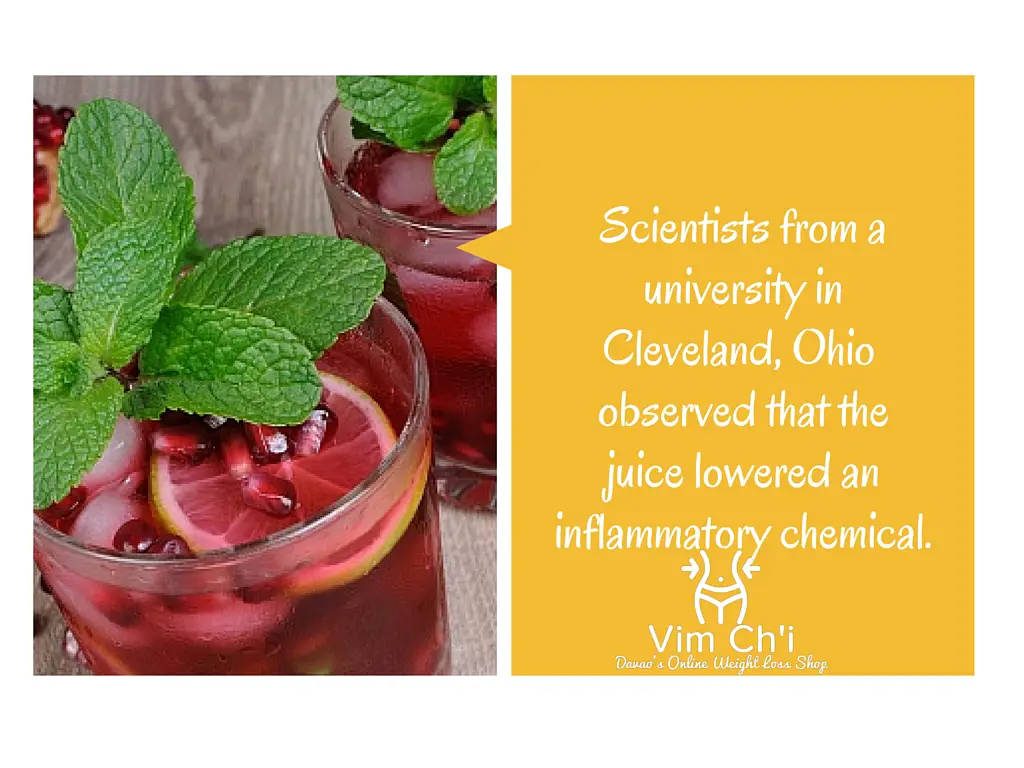 Pomegranate is a Persian fruit that can be an ideal food remedy for arthritis. The fruit itself has anti-inflammatory and anti-oxidant components that may relive aching knees, hands, or hips.
Pomegranate is a Persian fruit that can be an ideal food remedy for arthritis. The fruit itself has anti-inflammatory and anti-oxidant components that may relive aching knees, hands, or hips.
Scientists from a certain university in Cleveland, Ohio tried putting an extract from this fruit to tissue samples of damaged cartilage as a result of osteoarthritis.
They observed that the juice lowered an inflammatory chemical that’s linked to the overproduction of a certain enzyme.
In normal situation, this enzyme is important to replace cartilage. However, when it’s overly produced, just like in the case of arthritis, the cartilage wears away, instead of being replaced.
How to Use Pomegranate Juice to Ease Rheumatoid Arthritis Pain? Drink the juice, rather than pouring it directly onto your cartilage.
How About Pomegranate Capsules? It’s still better to drink the juice than take the capsules.
How Much to Drink? To get the health benefits of this juice as a food remedy to ease arthritis pain, drink up to 3 tablespoons of undiluted juice each day.
You might not like the bitterness of the juice. Thus, it’s perfectly okay to add a tablespoon of it to your glass of green tea, which is also rich in antioxidants and anti-inflammatory compounds.
It’s a 2-in-1 scenario (two solutions for one problem).
Green Tea
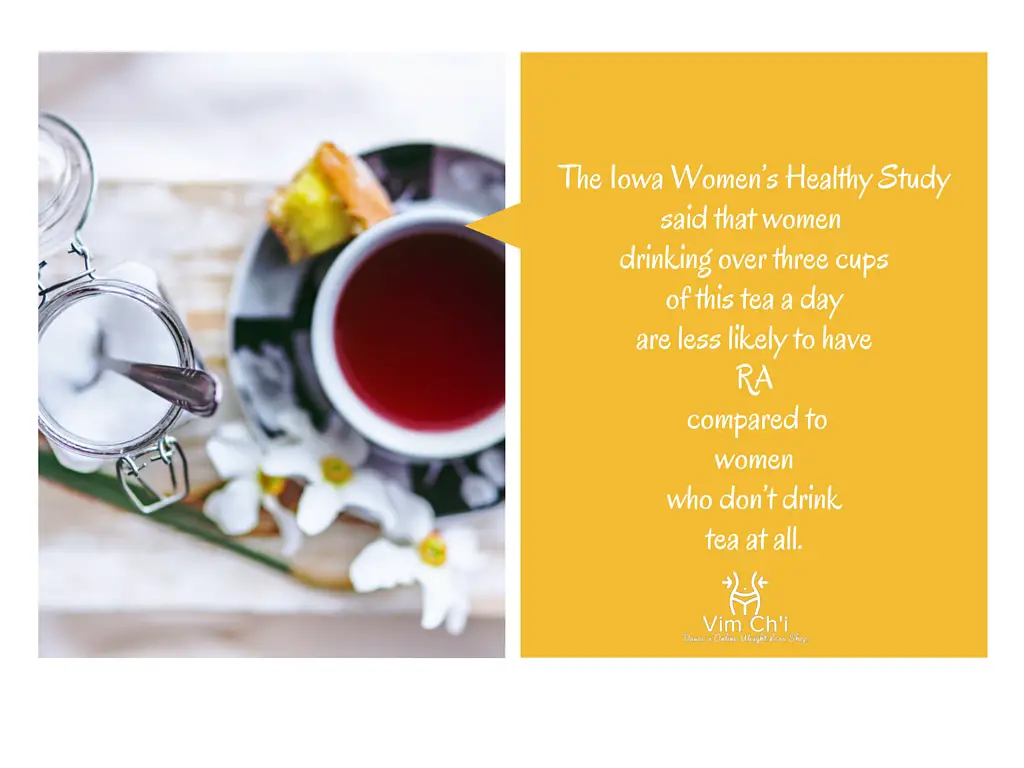 Speaking of green tea, this type of tea is also a food remedy to ease arthritis. And if you pair it with onions, tomato juice, berries and citrus fruit, you’ll have a crew of foods rich in quercetin.
Speaking of green tea, this type of tea is also a food remedy to ease arthritis. And if you pair it with onions, tomato juice, berries and citrus fruit, you’ll have a crew of foods rich in quercetin.
Quercetin is a chemical compound that can act as anti-inflammatory and anti-oxidant agents. In some animal studies, it showed that tea prevented or alleviated RA symptoms.
The Iowa Women’s Healthy Study said that women drinking over three cups of this tea a day are less likely to have RA compared to women who don’t drink tea at all.
How Many Cups of Tea Should You Drink a Day? You should aim for up to four cups of tea. You may take black tea or other types of tea but green tea is more preferred. It’s also best to pair green tea with other foods that contain high amount of quercetin.
To increase absorption of quercetin in the body, you should consider adding pineapple to your daily diet. The vitamin C content of this fruit increases anti-oxidant activity of quercetin.
Pineapple

Now that pineapple has been mentioned, let’s find out why this fruit can also be an excellent food remedy to ease arthritis.
One of the healthiest elements of pineapple is bromelain. It’s actually an enzyme that controls inflammation.
In fact, some studies showed that bromelain is as effective as some of the anti-inflammatory medicines in terms of reducing the pain of arthritis.
However, to get that benefit, you should consider the supplement form.
Bromelain supplements are made from pineapple stems. The stems of this fruit have the richest source of bromelain. Although it’s also present in the fruit, the amount is smaller than in the stems.
Your body’s digestive system won’t affect the benefits and effects of bromelain. However, the enzyme is destroyed in high temperatures.
Thus, it’s ideal to choose fresh or frozen pineapple, instead of canned or processed pineapple.
How Much Should You Take? You need to take up to 540 mg of bromelain each day to effectively ease and alleviate rheumatoid arthritis pain.
It’s hard to determine how much bromelain is in the pineapple fruit as it depends on the ripeness of the fruit. Plus, you also have to consider its exposure to heat.
However, having a cup of pineapple juice or fruit a day is a good goal.
And if you’re taking arthritis medicine and it’s irritating your stomach, pineapple can help you out as this fruit offers soothing effects to your stomach.
How About Leafy Green Vegetables?
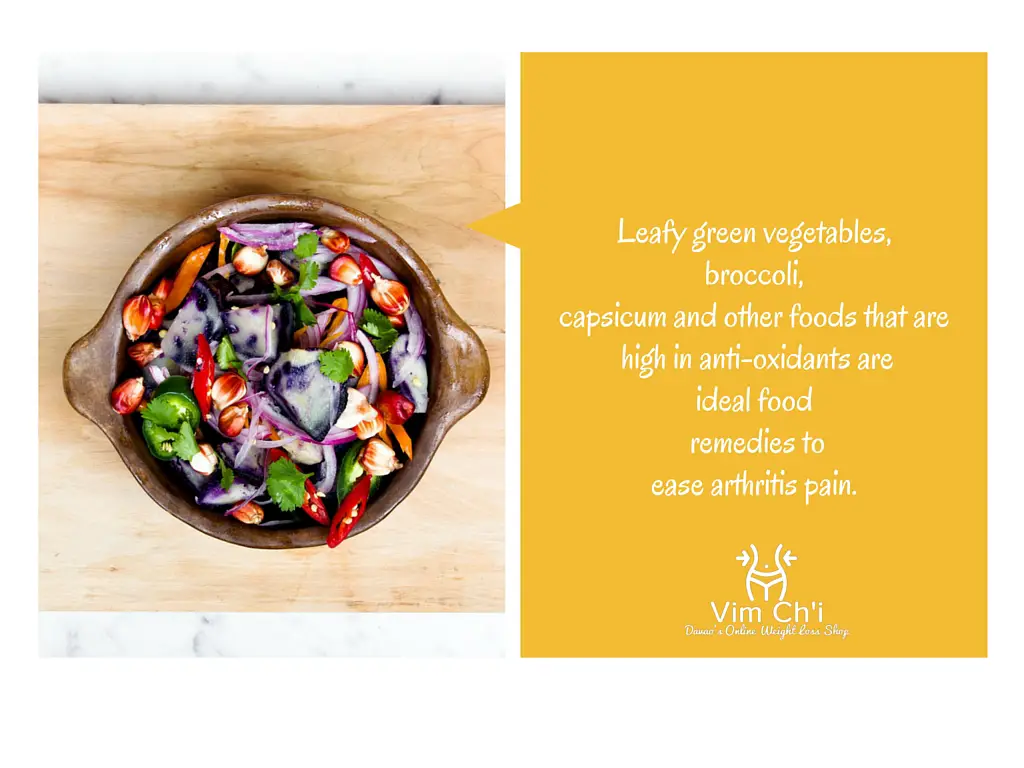
Yes, leafy green vegetables, broccoli, capsicum and other foods that are high in anti-oxidants are ideal food remedies to ease arthritis pain. Those colorful fruits are rich in anti-oxidants. And anti-oxidants are known to fight against the effects of free radicals. Since free radicals can damage your joints, these anti-oxidants can effectively protect your joints.
Free Radicals and Arthritis
Several studies have already shown that free radicals do play a role in causing arthritis.
In a recent study by Japanese scientists, free radicals negatively affect the ability of cartilage to maintain and repair itself.
Patients suffering from this medical condition have significant amount of freed radicals in their bodies. Thus, it’s just makes sense to get more anti-oxidants to eradicate those unstable molecules.
In a British study, scientists also found that a boosting intake of orange, yellow fruit and vegetables could lower risk of developing arthritis.
In that study, they found that those who ate the most fruit and vegetables that contain high amount of carotenoids lowered their risk of having this disease by 50%.
Aim to drink at least a glass of fresh orange juice in the morning and take carrots and kumara to boost your intake of carotenoids.
Taking foods with vitamin C could also lower your risk. Oranges, zeaxanthin and kiwifruit are good examples of fruits rich in this vitamin.
Regardless of the type of arthritis you’re suffering from, it’s ideal to increase your intake of fruit and vegetables.
Although there are supplements containing these anti-oxidants, those studies that proved their health benefits focused on foods.
How Much to Take? Up to six servings of vegetables. And up to four servings of fruit a day is ideal.
Fruit and vegetables are high in fiber. Since NSAIDs and other arthritis medicines can cause constipation, it makes sense to eat more fruit and vegetables to relieve such side effect.
Should You Take Supplements?
Many doctors do recommend taking of omega-3 fatty acids supplements. However, they still advise eating fatty fish. Since omega-3s are sensitive to heat, the supplements should be stored in the fridge.
Experts also recommend taking of vitamin E supplement to prevent the omega-3s from turning rancid.
Although omega-3s are effective in preventing and easing the pain of arthritis, you shouldn’t take more than 9 grams a day.
The recommended daily intake for general health is up to 3 grams a day while relieving tenderness and stiffness of the joints in the morning is up to 6 grams a day.
Bromelain supplements are also available either in capsule or table form. They’re usually combined with anti-oxidants and anti-inflammatory components.
The safe dose for bromelain supplement is up to 2,000 mg a day.
What Foods You Must Not Eat?
As mentioned earlier, arthritis is the result of inflammation in the body. Thus, it’s just ideal to control the inflammation by avoiding foods that can cause such.
When it comes to fish, you should only limit your intake as not all fish species are useful in this purpose as they can aggravate your condition.
Omega-3s are beneficial for arthritis but omega-6s aren’t as they trigger the production of hormones that cause inflammation.
Dairy products should also be avoided as they tend to increase inflammation in patients with arthritis. Some food proteins may even trigger antibody production in certain individuals.
And when your allergy is triggered, your antibodies may attack joint lining.
But, just because these foods are a no-no to patients with arthritis, they don’t mean you must avoid them entirely. Check with your doctor first and consult a dietitian to help you find triggering foods.
Lose Weight
Excess weight can put too much burden on your joints. The foods high in fats may rob you of your energy while they trigger inflammation.
To lose weight and alleviate arthritis pain, avoid processed foods and sugar.
Instead opt for fresh fruits and vegetables. For protein, go for lean protein. They’re not only healthier but they’re also slowly digested by your stomach. As a result, you’ll feel full for longer.
When you start to choose these food remedies to alleviate rheumatoid arthritis pain, you’ll start feeling reduced pain as the result of this medical condition.
Do you eat these food remedies for arthritis pain? Are they effective?
Speak Now ... Or Forever Hold Your Peace